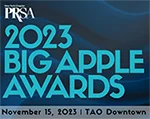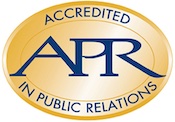Hundreds of thousands of Americans died so that not only their fellow Americans but citizens in numerous other nations would have rights such as due process before being denied anything and the right to face accusers.
Members of PR Society of America have lost those rights.
 The Society, accusing two members of improper use of the Society’s website, has blocked their ability to access the website, effectively cancelling their memberships.
The Society, accusing two members of improper use of the Society’s website, has blocked their ability to access the website, effectively cancelling their memberships.
There is no recourse for the members except a lawsuit. Society leaders and staff don’t return their calls or e-mails.
Stephanie Cegielski, VP-PR, takes the tack that Americans only have the right to face their accusers, present evidence in their own behalf, and be judged by a panel of their peers when the matter has been brought to a court.
These are rights conferred by the Fifth and 14th Amendments. Cegielski is correct in saying that the Amendments refer to government bodies at the state and federal levels.
But operating in legal channels is very expensive and an option not available to most Americans. They depend on a sense of fairness among those who lead organizations to which they belong.
Legalities Trump “Ethics”
The Society, whose Code of Ethics says that “Ethical practice is the most important obligation of a member,” cites what is legal rather than what is ethical whenever an issue arises.
The ethical way to report anything financial is the sooner the better. But the Society, citing the law, withholds its IRS Form 990 that has the pay packages of the top six staffers until just before the final legal deadline of Nov. 15. It never posts the 990 on its website but insists that members either come to h.q. to view it or send in a written request for it.
The Assembly each year is deprived of access to the 990. Delegates at the 2013 Assembly were not aware that CEO Bill Murray got a $61,000 bonus in 2012, raising total remuneration to $423,000. He resigned March 7, 2014 with only the explanation that he had done so after “deep reflection” and was moving to another job.
Members, unless they make an extra effort, are deprived of key information about their Society. Since 2005, rank-and-file members have not had access to the national list of Assembly delegates.
Delegates themselves have to make individual requests to see the list. Rank-and-file members do not know who is in the Assembly, what the delegates say, or how they vote unless they attend the Assembly in person. Reporters were allowed at the 2010 Assembly but not allowed to take pictures or record anything. They were banned completely from the 2011, 2012 and 2013 Assemblies.
Legalities Frustrated Copied Authors
The Society took the legal approach when a group of 12 authors organized a committee to seek compensation for having their articles copied and sold without their permission from 1978-94 when an expose stopped the practice cold.
“We will fight this clear into court,” said COO Ray Gaulke in 1994 to the Newsletter on Newsletters. The Society said that since it is a “library,” it had the right to “lend” one copy out of an author’s work and charge a “loan fee.”
The practice had started out by selling a packet of original materials to members. In later years, the charge was $18 for members and $55 for packets that included 60-100 pages of copies articles, some of them from publications whose cover price was in the hundreds of dollars.
Even selling groups of original articles was illegal because combining articles and selling them as a packet creates a “new work.” Articles and even chapters of books were included. Authors do not want their works mixed in with the works of others and sold.
Adding to the seriousness of the offense is that the articles were not light reading but were “professional development,” used for building marketable skills such as tips for dealing with editors. Clients learned techniques for interviewing PR firms and gaining the best contracts. PR firm owners learned how to prevent employees from walking out with accounts.
The authors hired a law firm and investigated filing a lawsuit. However, the lawyers cautioned that the Society was mounting a no-holds-barred defense that would no doubt include countersuits against each author personally. The lawyers also cautioned that it would cost many tens of thousands to launch the suit and victory was problematical because copyright law is so “murky.” In addition, none of the publishers involved, such as Prentice-Hall and Longman, offered any help. They did not want to get on bad terms with the PR Society.
Packet volume reached 3,400 a year by the early 1990s with profits of about $60,000 a year, according to Society financial reports. The Assembly used to get far more financial information from h.q. than it has in recent years.


 PRSA-NY today announced its five honorary co-chairs for its Big Apple Awards ceremony gala slated for TAO Downtown on Nov. 15.
PRSA-NY today announced its five honorary co-chairs for its Big Apple Awards ceremony gala slated for TAO Downtown on Nov. 15. PRSA-NY president Carmella Glover today issued a "heartfelt apology" on behalf of the chapter for her Oct. 14 message that "caused disappointment and hurt to some of our valued members."
PRSA-NY president Carmella Glover today issued a "heartfelt apology" on behalf of the chapter for her Oct. 14 message that "caused disappointment and hurt to some of our valued members." The leadership of Public Relations Society of America is backing a move to change the current “must-have” APR accreditation to “strongly preferred” as a requirement for a seat on its board of directors.
The leadership of Public Relations Society of America is backing a move to change the current “must-have” APR accreditation to “strongly preferred” as a requirement for a seat on its board of directors. Public Relations Society of American today named Linda Thomas Brooks CEO, succeeding CFO Phil Bonaventura, interim chief since July 2019.
Public Relations Society of American today named Linda Thomas Brooks CEO, succeeding CFO Phil Bonaventura, interim chief since July 2019.


 Have a comment? Send it to
Have a comment? Send it to 
No comments have been submitted for this story yet.